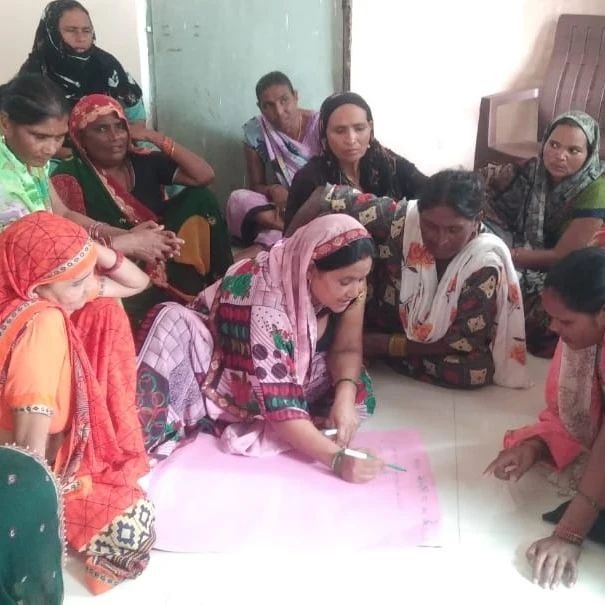

Background
Social Action for Knowledge Building and Awareness Raising (SAKAR) emerged through extensive deliberations involving its co-founders, Ms. Nitika Pant and Ms. Shilpi Agarwal. Drawing from their experiences in resource agencies and institutions, the decision crystallized to transition from theoretical understanding to practical implementation. The focus shifted towards continual learning, experimentation, and direct engagement with pressing issues.
The discourse extended over several months, culminating in the definitive choice to initiate endeavors under the SAKAR banner. A pivotal moment in this journey was the enlightening conversation with Dr. Rajesh Tandon, President of Participatory Research in Asia. The discussion delved into a critical reflection on the development sector and the nuances involved in institution-building. Throughout the 45-minute dialogue, a resounding message echoed: "Take stock, exercise patience, the challenges are formidable." However, etched in memory is Dr. Tandon's encouraging statement on the PRIA staircase, resonating with the empowering notion, "If I can do it, you can do it as well." This affirmation served as a catalyst, infusing renewed vigor and determination, ultimately leading to the registration of SAKAR with a seven-member board.
We in SAKAR believe that information, awareness and the zeal to perform better is an evolutionary process and leads to societal change. The voice of the unheard and vulnerable needs to be raised, so that equal opportunities are available and imbalances of caste and gender reduced. As a voluntary development organization SAKAR strives to make the lives of the marginalized, especially women and children, more meaningful by helping them engage in the change process. The key to this lies in fulfilling information needs and developing a feeling of unity/togetherness in them.
Our decision to operate in Bareilly, situated in the central-western part of Uttar Pradesh, was strategic. We selected Bareilly due to the substantial presence of partners and organizations addressing issues in both the eastern and western regions of the state. Additionally, the Bundelkhand region boasted a significant number of organizations dedicated to the well-being of women and girls.
Upon further exploration of the Rohilkhand region, we discovered that despite Bareilly having over 3000 registered organizations, there was a conspicuous absence of initiatives addressing violence against women and girls. Furthermore, the region's advantageous connectivity to both Lucknow and Delhi promised enhanced networking opportunities.
The inaugural workshop, held in January 2006, marked the commencement of our efforts. It centered around disseminating a report crafted by Sahbhagi Shikshan Kendra, Lucknow, detailing the recently conducted panchayat elections in the state. Our journey commenced with the collection of fundamental information, essentially establishing a baseline in eight villages of the Bhojipura block.
The formation of women's groups initiated with a consciousness-raising campaign on the significance of collectivization, leading to the establishment of Self-Help Groups. This transformative process unfolded over the course of a year. Subsequently, we secured support from the Rajiv Gandhi Foundation, enabling the establishment of literacy centers catering to women and girls.
Our focus extended to marginalized groups, particularly Dalit and minority women and girls, as we delved into understanding their unique challenges related to mobility, violence, education, and health.
Later a support by Sir Dorabji Tata trust, to work with children, especially girls, who were weak in studies, led to the expansion of the area from 8 to 10 villages, where we started remedial classes for the children and deepened our work with them, learning about their rights and spreading awareness about the same. The field base was becoming strong, and the women groups were also developing, this progress led to expansion of work and with the support from Action Aid and SDTT again we did a lot of focused work on functional literacy of women, their leadership. Addressing the issues of domestic violence, access to government schemes and formation of community-based organisation called Mahila Shakti Sangathan. We set examples of doing activities which were hardly done with minority women like kite flying, pad yatra, night film shows, celebration of pone billion riding day, doing various campaigns, exposure visits etc. This not only accelerated our work, but it also helped us in taking challenges head on and helped in engaging with the various government departments leading to information regarding various government schemes and making the government institutions active.
Our commitment to addressing violence against women and girls gained momentum as we delved into case work. A community-based organization, Mahila Shakti Sangathan, emerged specifically for Dalit (including Maha Dalit) and minority women, swiftly evolving into a significant emblem of female empowerment. Over time, this organization actively participated in panchayat elections, eventually establishing itself as an independent entity. Empowered and well-equipped, the organization now undertakes initiatives pertaining to violence against women (VAW), with a particular focus on issues such as domestic violence and early or forced marriage of girls.
Simultaneously, our engagement with adolescent girls commenced, encompassing a spectrum of concerns related to sexual and reproductive health and rights (SRHR), sports, mobility, access to public spaces, and the right to education. Overcoming initial challenges, sports, particularly football, gained widespread acceptance among the girls in every village we intervened in.
As of 2023, our intensive work spans 28 villages, impacting approximately 10,000 women and 5,000 girls. Mahila Shakti Sangathan, our community-based organization, comprises around 2,500 women. Currently, our efforts involve collaborating with 800 adolescent girls, alongside nearly 200 service providers and other stakeholders. Looking ahead, we aspire to expand our initiatives to cover at least five blocks in the district and extend our reach to the adjoining district of Rampur in Uttarakhand State.
Our gratitude extends to all who have been part of our journey since 2006, including donors, our target groups, stakeholders, the administration, media, and, above all, the dedicated team at SAKAR.
Geographical coverage area
SAKAR’s Area of Intervention-
| Block |
Village |
Intervention |
| Bhojipura |
20 |
Deepening |
| Bhuta |
10 |
Expansion |
| Nawabganj |
10 |
Expansion |
| Fatehganj Pashchimi |
10 |
Expansion |
| Bareilly Town |
4 Bastis |
Deepening |